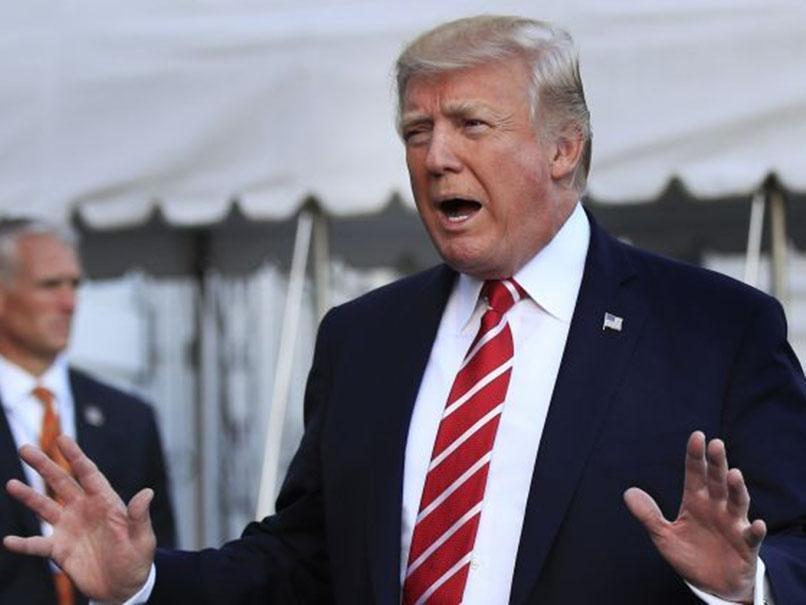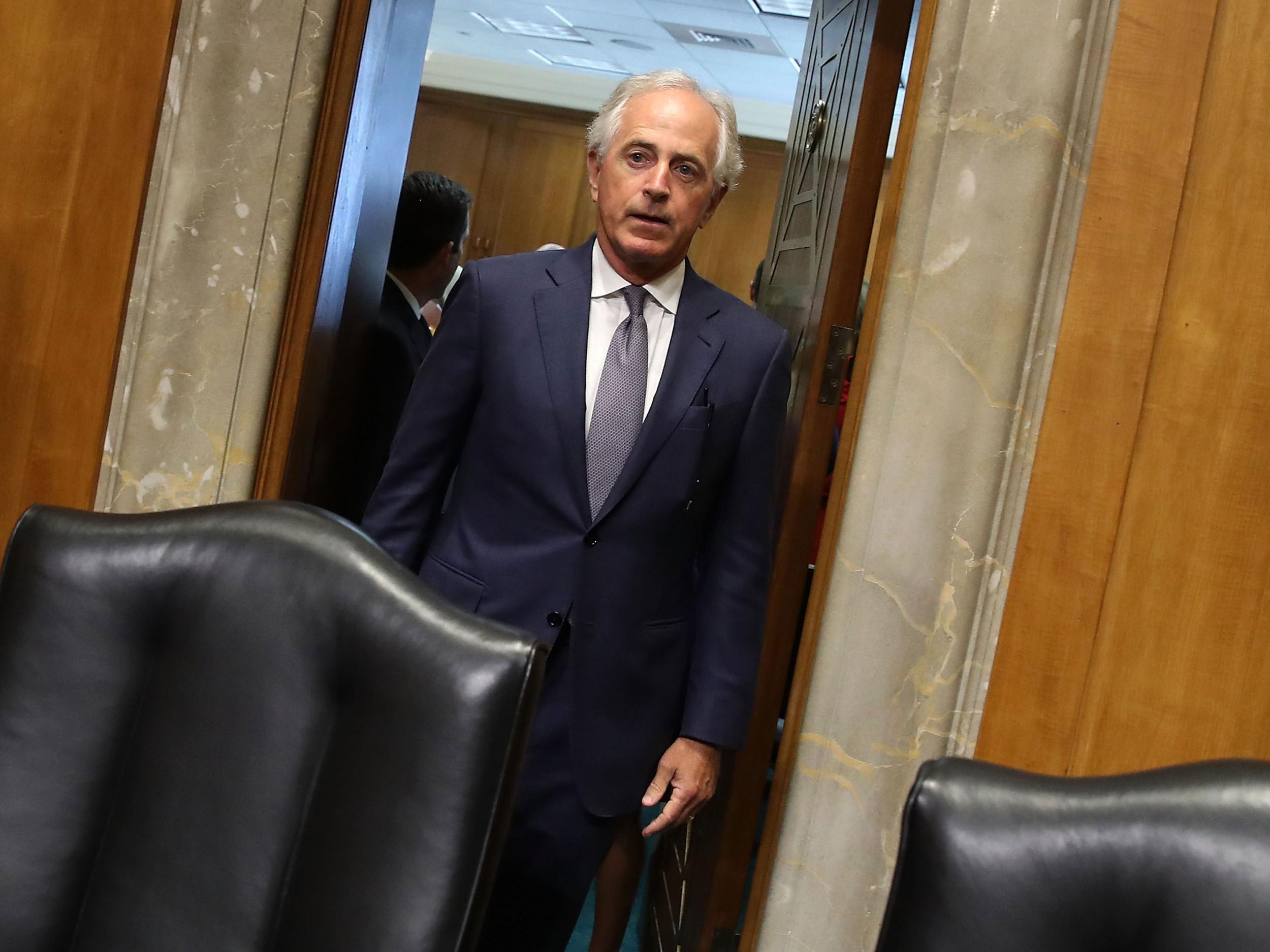Senator Bob Corker confirms Republicans know Trump is unfit as President

Your support helps us to tell the story
From reproductive rights to climate change to Big Tech, The Independent is on the ground when the story is developing. Whether it's investigating the financials of Elon Musk's pro-Trump PAC or producing our latest documentary, 'The A Word', which shines a light on the American women fighting for reproductive rights, we know how important it is to parse out the facts from the messaging.
At such a critical moment in US history, we need reporters on the ground. Your donation allows us to keep sending journalists to speak to both sides of the story.
The Independent is trusted by Americans across the entire political spectrum. And unlike many other quality news outlets, we choose not to lock Americans out of our reporting and analysis with paywalls. We believe quality journalism should be available to everyone, paid for by those who can afford it.
Your support makes all the difference.President Donald Trump's feud with GOP Sen. Bob Corker of Tennessee escalated over the weekend, and in an interview with the New York Times, Corker flatly warned that Trump's antics may set us "on the path to World War III."
But while that is obviously alarming, what Corker said elsewhere in the interview may end up having more of an impact, because it opens the door to a whole new round of press scrutiny of the GOP's ongoing enabling of Trump. Corker confirmed that most Senate Republicans view Trump as, well, dangerous and crazy in The Times:
"Mr. Trump poses such an acute risk, the senator said, that a coterie of senior administration officials must protect him from his own instincts. "I know for a fact that every single day at the White House, it's a situation of trying to contain him," Mr. Corker said in a telephone interview. . . .
"Without offering specifics, he said Mr. Trump had repeatedly undermined diplomacy with his Twitter fingers. 'I know he has hurt, in several instances, he's hurt us as it relates to negotiations that were underway by tweeting things out,' Mr. Corker said.
"All but inviting his colleagues to join him in speaking out about the president, Mr. Corker said his concerns about Mr. Trump were shared by nearly every Senate Republican.
" 'Look, except for a few people, the vast majority of our caucus understands what we're dealing with here,' he said, adding that 'of course they understand the volatility that we're dealing with and the tremendous amount of work that it takes by people around him to keep him in the middle of the road.' "
Elsewhere in the interview, Corker declined to answer when asked if he believes Trump is unfit for the presidency. But the only reasonable way to read all these comments is as a declaration that Trump is indeed unfit - and that most Republicans know it. After all, Corker had previously said that Trump's inner circle is helping to "separate our country from chaos." Now he has added that Trump needs to be restrained by his inner circle from devolving into conduct that could end up unleashing untold global destruction - and that most Republicans know it.
Corker is getting a lot of press plaudits for his unvarnished appraisal. But as James Fallows writes in The Atlantic, there is a good deal that Corker can actually do right now if he wants to mitigate the threat that he himself says Trump poses. As chairman of the Senate Foreign Relations Committee, he has a range of powers that could help constrain Trump, including the power to hold public hearings to draw public attention to the ways in which Trump's temperament threatens untold damage. At a minimum, Corker can be asked whether he intends to do these things, and if not, why not.
But whatever Corker says and does now, his new comments should precipitate a fundamental change in the way the press treats the ongoing GOP enabling of Trump. Corker has forced out into the open the fact that Republicans recognize the sheer abnormality and danger to the country of the situation we're in, which opens the door for much tougher media questioning of them about their awareness of - and acquiescence to - this state of affairs.

This can start with a simple query: Do Republicans agree with Corker that Trump regularly needs to be constrained by his top advisers from engaging in conduct that threatens severe damage to the country and the world? If so, what are Republicans prepared to do about it?
In August, Jane Chong and Benjamin Wittes offered a useful set of guidelines for thinking about Trump's misconduct in the Lawfare blog. They divided it into three categories. First, there are his "abuses of power," such as the nonstop self-dealing, the pardoning of former sheriff Joe Arpaio, and the firing of his FBI director. Second, there are his "failures of moral leadership," which constitute a general degradation of his office via, among other things, his unprecedented, serial lying and efforts to destroy the institutional legitimacy of the free press. To this second category we can add Trump's refusal to unequivocally condemn the Charlottesville, Virginia, white supremacists and the White House's use of taxpayer funds to stage a weekend stunt in which Vice President Mike Pence walked out of a football game, which are both part of a broader effort to continue stoking divisions.
Third, there is the "abandonment of the basic duties of his office," which includes the failure to make appointments and (I would add) the deep rot of bad faith that has infested the White House's approach to policy: He indicated he'd sign anything at all that would let him boast of destroying Barack Obama's signature accomplishment. I would suggest a fourth category of misconduct: Trump's sheer megalomaniacal indifference to the fundamental notion that his office confers on him any obligation to the public of any kind. This overlaps with the conduct discussed above and also includes the refusal to release his tax returns and his ongoing sabotage of the Affordable Care Act, which could harm millions.
As Chong and Wittes note, what's challenging is to determine what sort of level of degradation of our institutions, political system and norms of political conduct all of this misconduct adds up to when taken together. We do know that congressional Republicans continue to enable many of these strands in isolation, and they continue to airbrush away the significance of misconduct that is glaring enough to require their condemnation, usually by making some variation of the claim that Trump is learning on the job. But Corker has now asserted that Republicans know Trump's presidency constitutes an ongoing, abnormal, multifaceted danger to the country. This should intensify media scrutiny of this series of dodges, evasions and enabling exercises, and make it harder for Republicans to get away with them.
Washington Post
Join our commenting forum
Join thought-provoking conversations, follow other Independent readers and see their replies
Comments